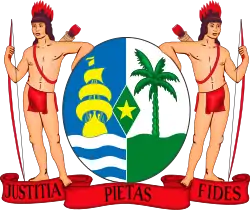National Military Council (Suriname)
The National Military Council (Dutch: Nationale Militaire Raad, NMR) was the ruling military junta of Suriname between the 1980 Sergeants' Coup and the 1987 general election.
Part of a series on the |
|---|
| History of Suriname |
 |
|
|
History
Formed immediately following the Sergeants' Coup,[1] the NMR initially consisted of the following 8 military officers:
- Dési Bouterse (sergeant major)
- Roy Horb (sergeant)
- Ramon Abrahams (sergeant)
- Stanley Joemman (sergeant)
- Chas Mijnals (sergeant)
- Laurens Neede (sergeant)
- Michel van Rey (first lieutenant)
- Badrissein Sital (sergeant major)
Sital became chairman of the NMR, although Bouterse (the new commander of the Suriname National Army) soon emerged as the strongman. Of these eight, only Horb and Bouterse had actually participated in the coup as members of the "Group of Sixteen" (Dutch: Groep van zestien). Abrahams, Neede and Sital had been arrested for forming a military union and were at that time imprisoned in the Memre Boekoe barracks. Politicians from mainly left-wing (splinter) parties acted as advisers: Eddy Bruma, Frank Leeflang, Freddy Derby (PNR), Rubin Lie Pauw Sam (VP), Iwan Krolis (PALU) and Henk Herrenberg (SPS).
The NMR appointed Henk Chin A Sen as the new prime minister on March 15, 1980,[2] with André Haakmat appointed as the deputy prime minister on August 15, 1980.[3] Negotiations were held with the then president Johan Ferrier, resulting in the preservation of the democratic legal order and the existing constitution; Ferrier then stayed on as president, before he was eventually ousted on August 15, 1980.[4]
The NMR's course was moderate at first, although several wings developed. On September 15, 1980, the 'left wing' consisting of Mijnals (member of the RVP), Sital and Joemman were arrested and sentenced to several years in prison on conspiracy charges. Hereafter, Bouterse also turned to the left, with the result that the three were released after a few months. Sital was appointed Minister of Health, while Mijnals and Joemman were given important posts in the army. Bouterse's change of course was partly prompted by the increasing influence of Haakmat, who was therefore relieved of his post on January 7, 1981.[5]
The NMR's socialist course, strengthening its links with Cuba, Grenada (under the PRG) and Nicaragua (under the FSLN), was one of the reasons for massive protests and strikes during 1982, which would eventually lead to the December murders. Grenada's prime minister Maurice Bishop is said to have played an important role in this, according to several sources, by inciting Bouterse to take firm action.
After the December murders, the NMR continued until general election was held on November 25, 1987. Incidentally, after the execution of Bishop and the United States invasion of Grenada in October 1983, Bouterse had abandoned his left course and expelled all Cuban advisers from the country.[6] After the 1987 general election, Bouterse remained army leader until 1988.
See also
References
- Caribbean Review (1980). "The Year of the Sergeants". University of Florida. Retrieved 22 June 2020.
- "Chin A Sen onder druk afgetreden". Reformatorisch Dagblad via Digibron (in Dutch). 5 February 1982. Retrieved 23 June 2020.
- "Haakmat op zware post in Suriname". Nieuwe Leidsche Courant (in Dutch). 16 August 1980. p. 7.
- "Suriname President Ousted in Army-Backed Coup; U.S. Says Capital Is Calm". The New York Times. 15 August 1980. Retrieved 14 December 2020.
- "Haakmat schaakmat". Leidse Courant (in Dutch). 7 January 1981. p. 1.
- "Suriname Ousts Envoy And Halts Cuba Pacts". The New York Times. 27 October 1983. Retrieved 14 December 2020.
External links
- The Year of the Sergeants by Caribbean Review (1980)